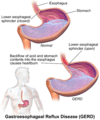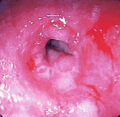Gastroesophageal reflux disease facts for kids
Gastroesophageal reflux disease (GERD) is a common health problem that affects the tube connecting your mouth to your stomach. This tube is called the oesophagus. When you have GERD, the contents of your stomach, like food and stomach acid, flow back up into your oesophagus. This can cause a burning feeling in your chest, often called "heartburn." It's important to know that heartburn has nothing to do with your actual heart!
Contents
What is GERD?
GERD happens when a special muscle at the bottom of your oesophagus doesn't close properly. This muscle acts like a one-way door, letting food into your stomach but usually stopping it from coming back up. If this door is weak or opens too often, stomach acid can splash back into your oesophagus. This acid can irritate the lining of your oesophagus, causing discomfort.
What are the Symptoms of GERD?
The most common symptom of GERD is that burning feeling in your chest, known as heartburn. This feeling often gets worse after you eat, especially large meals, or when you lie down.
Other Signs to Look For
- A sour or bitter taste in your mouth, especially after waking up.
- Feeling like food is stuck in your throat or having trouble swallowing.
- A dry cough or a sore throat that doesn't go away.
- Sometimes, it can even affect your teeth, causing the enamel to wear away.
If you often feel these symptoms, it's a good idea to talk to a grown-up or a doctor.
What Causes GERD?
Several things can make GERD more likely to happen or make its symptoms worse.
Food and Drink Triggers
Certain foods and drinks can relax the "door" muscle or increase stomach acid. These include:
- Spicy foods
- Fatty or fried foods
- Chocolate
- Peppermint
- Citrus fruits and juices
- Tomato products
- Fizzy drinks
- Caffeine
Lifestyle Factors
- Eating large meals, especially right before bedtime.
- Lying down soon after eating.
- Being overweight can put pressure on your stomach, pushing acid upwards.
- Wearing clothes that are too tight around your stomach.
How is GERD Treated?
The good news is that there are many ways to manage GERD and feel better.
Simple Changes You Can Make
- Try to eat smaller meals more often instead of a few big ones.
- Wait at least 2-3 hours after eating before lying down or going to bed.
- Avoid foods and drinks that trigger your symptoms.
- If you are overweight, losing some weight can help reduce pressure on your stomach.
- Raise the head of your bed by a few inches using blocks under the bedposts. This helps gravity keep stomach acid down.
When to See a Doctor
If lifestyle changes don't help, or if your symptoms are severe and happen often, a doctor can help. They might suggest medicines that reduce stomach acid or help the oesophagus heal. It's important to get help if GERD is bothering you, as long-term acid exposure can sometimes lead to other problems.
Images for kids
 | James Van Der Zee |
 | Alma Thomas |
 | Ellis Wilson |
 | Margaret Taylor-Burroughs |




